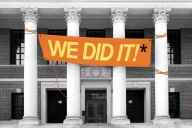You have /5 articles left.
Sign up for a free account or log in.
Sebastian Myrick wants to help as many students as possible get to and through college.
But the longtime director of TRIO college-prep programs at South Seattle Community College regularly has to turn away undocumented students who are not eligible for the college access programs funded by the federal government. In the last year, about 15 percent of the high school students who applied for a TRIO program were undocumented.
“The conversation with those students is super challenging,” Myrick said. “We don’t want to shame anyone.”
Myrick and other TRIO directors and advocates, along with higher education associations, have long sought to change the requirement that students participating in TRIO be U.S. citizens, and the Biden administration might be gearing up to heed those calls. The Education Department is planning to amend the current TRIO regulations—a step that could include “technical improvements to programmatic eligibility and operations,” according to the agency’s regulatory agenda for 2023.

U.S. Department of Education
The federal TRIO program is a collection programs that started in 1965 in response to the War on Poverty to help underserved student groups go to college. The Education Department is set to spend nearly $1.2 billion on TRIO in the current fiscal year.
The department, which recently held a series of hearings on its agenda, hasn’t said exactly what changes it’s considering. TRIO directors and advocates, including Myrick, focused on the need to open up TRIO to undocumented students during comment periods at the hearing. Such a change, advocates said, would make the programs more effective and help colleges better serve low-income and first-generation students, who are the focus of TRIO.
If the department sought to remove the requirement, the agency would likely face political pushback and opposition from some Republicans and those opposed to providing public benefits to undocumented individuals. Any change to TRIO’s eligibility criteria is subject to the negotiated rule-making process and public comment.
“For the last 20 years, from the DREAM Act to [the Deferred Action for Childhood Arrivals program], we’ve treated DACA students as poster children for immigration reform but have done very little to support them in their education endeavors or dreams,” said Rafael Topete, director of TRIO and migrant programs at California State University, Long Beach, at the hearing. “The TRIO community is proposing that we allow those students to come out of the shadows.”
California received a waiver this academic year to allow undocumented students to access TRIO services on a trial basis.
Federal law has excluded undocumented students from receiving federal grants, loans, or work assistance since 1986. However, advocates say the statute doesn’t forbid those students from participating in other services under Title IV of the Higher Education Act, which authorizes federal financial aid programs such as TRIO.
“Our position is we’re not transferring money to students; we’re giving them information and support so that the department has the authority without congressional action to change the eligibility requirements for TRIO,” said Maureen Hoyler, president of the Council for Opportunity in Education, an organization focused on helping low-income students, first-generation students and students with disabilities access higher education.
Hoyler said that her organization and other advocates lobbied the Obama administration to change the requirement, but to no avail. They renewed the push in 2021 under the Biden administration and were heartened to see the issue on the agenda.
“It’s a victory to be on the agenda,” she said. “I don’t think we’ve won. I don’t think we’ve lost.”
Jon Fansmith, senior vice president for government relations at the American Council on Education, which supports removing the requirement, said the current regulations are impractical given that institutions are already serving undocumented students.
“The department would have to be clever to make it work, but it’s something we would like to see,” he said.
‘Right Thing to Do’
The current regulations are frustrating, counterintuitive, stigmatizing and waste resources, Hoyler and others said in interviews and at the hearings.
“It’s the right thing to do,” Hoyler said of removing the requirement.
TRIO staff are often working in public high schools, which serve all students. But if a staff member wants to do a presentation about applying to college, they or the school have to filter out the undocumented students first in order to comply with federal law. That means asking invasive questions of students who might not know if they are in the country legally, Myrick and Hoyler said.
Asking about immigration status is “a waste of time that we could be working on helping people be successful and preparing for college,” Myrick said.
Additionally, at a time when many states allow eligible undocumented students to receive in-state tuition, the requirement doesn’t make sense, Hoyler said.
“If our states are saying, ‘Hey, we want these students to fulfill their potential,’ should the federal government be saying, ‘We’re not going to help the states do this’?” she asked.
Instead, Hoyler said that the federal government, colleges and other groups should be emphasizing potential when talking to young people and adults.
“To say to them, ‘Hey, you shouldn’t be thinking about going to college. You shouldn’t be preparing for your future’—that’s not a message we want to give any young person or adults in this country that’s trying to make a better life for themselves,” she said.
Myrick said that the TRIO rules put him and others in an awkward situation when they have to turn away undocumented students.
“We have to explain, hey, I’m really sorry, but the federal government pays for these services and they also don’t allow us to provide services to you,” he said.
He does try to refer those students to other resources, but there aren’t many other options available to this group. School counselors and other staff members at the high schools where he works tend to be busy with all the other jobs they’re juggling. They don’t have time to work on college applications or take students on college visits, he said.
“The rule change would make us more effective within the schools, more trusted and make it easier for us to do our work,” he said.








